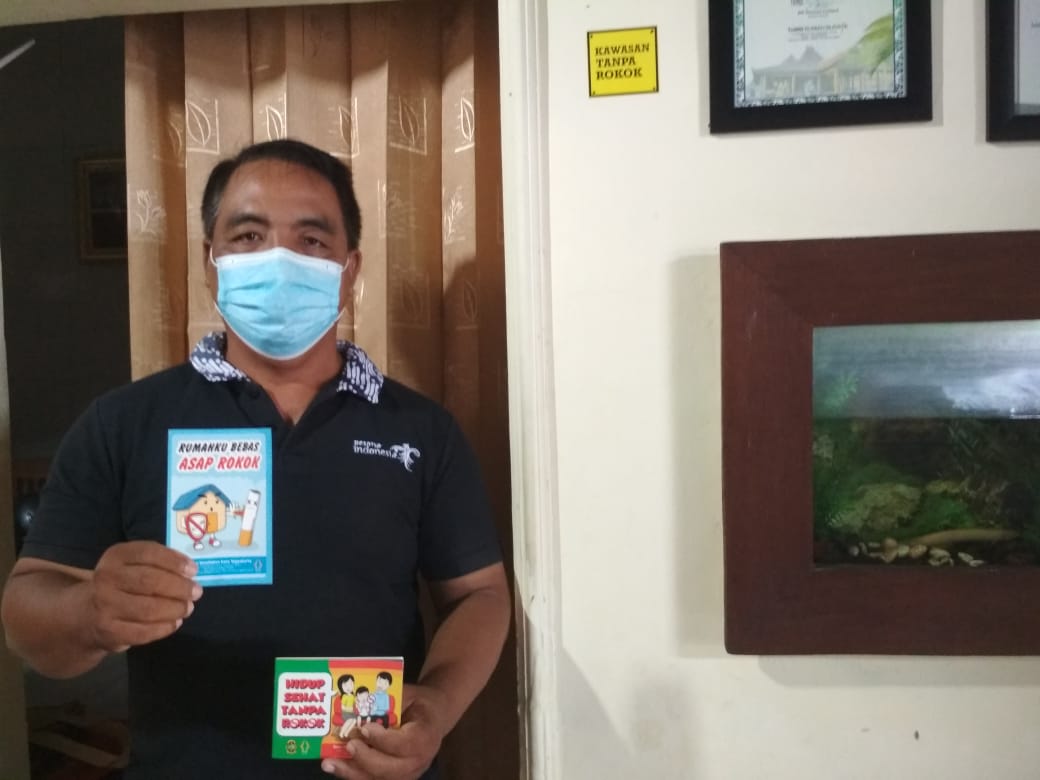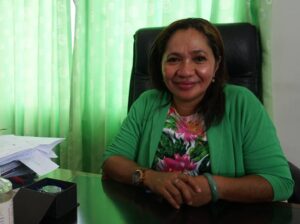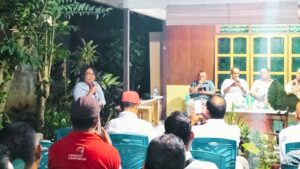
Caption: Tri Handoko Putra shows a guidebook of cigarette smoke-free houses in the community unit RW 04 in Wirobrajan district. (Photo by Somad)
One of the houses, which belongs to Tri Handoko, displays a lot of warning stickers about smoking bans on its walls. The house with Javanese architecture design also stores a pile of pocket books about the dangers of inhaling the smoke of tobacco products. “Cigarette smoke is forbidden here,” said Tri, the 42-year-old man who initiated the movement ‘Anti-smoking Village’.
To the journalist from Jaring.id, who visited his house on Thursday, April 6, 2021, Tri showed various notes about how people in the community finally succeeded in freeing themselves from the snare of cigarettes.
When his fingers were busy flipping through the papers with the almost-faded writings, his forefinger pointed at a photo of activities before the community participated in a competition of cigarette smoke-free village held by the Yogyakarta Health Agency in 2008.
Reminiscing about the event described in the dull notes, he smiled upon the unexpected winning of the community unit he led. He never thought that the community would win the first prize in the competition.
“Look at this,” he said while showing a photograph of the handover of prize from the Yogyakarta Health Agency officials.
Bearing the title as a champion then prompted Tri to do further. He felt that he had the responsibility to permanently free his home environment from cigarette smoke. In 2009, Tri started his move by conducting a survey to map smoking behavior of residents living in RW 04. The survey revealed that almost 80 percent of the community members were active smokers. “They reasoned that they smoke in their own houses and bought cigarettes on their own, so why should anyone else forbid them? That’s what they thought.”
Feeling uneasy with this condition, Tri carried out all efforts to persuade the residents to free their houses from cigarette smoke. He gained support from the tobacco control group established by the Faculty of Medicine, Gadjah Mada University (UGM), Quit Tobacco Indonesia.
RW 04 is one of the four community units that were designated to be the pilot for smoke-free house activity, or called as Rumah Bebas Asap Rokok (RBAR). “One of the programs in the RBAR is to discuss with the residents. We tried to approach them,” Tri explained.
At first, the discussion that was organized every week sparked pros and cons. .According to Tri, some of the residents did not believe in the destructive effects of cigarettes on bodily functions. However, the efforts slowly paid off. “After long discussions, the smokers were moved. They changed their mind, particularly because they were concerned about the impacts on their children,” Tri emphasized.
A year after the program kicked off, the number of smokers in RW 04 gradually decreased. Out of 240 active smokers in the community, according to Tri, almost half had quitted smoking.
The residents were committed to implement a number of rules, including not providing ashtrays for visiting guests, not smoking in the house or near pregnant women and children. As for the residents who are still smoking, they provided a 12-square meter smoking area. “By doing this, we simply want to limit the smokers by smoking more responsibly,” Tri said.
Currently, not a few residents are actively involved in controlling cigarette smoke. They even often work together to create sand containers made of pottery to put out cigarettes. They put the container, locally called sesegan, in their front yard. There are at least 15 neighborhood units (RT) that have been doing this. “This is the result of self-subsistence in the community,” said Tri, while showing one of the spots where the sesegan was placed.
The awareness of the residents to promote health in the community has brought RW 04 to be the first area in Yogyakarta that implements a smoke-free area at home, even long before the ratification of the Bylaw Number 2 of 2017 concerning Smoking-Free Area. “This activity has a good impact on the residents,” said Tri.
To ensure a commitment that has lasted more than 10 years, RW 04 residents also agreed not to hold activities using funds sourced from the cigarette industry. Citizens prefer to fund artistic, sports and Indonesian independence celebrations with their own money or through the grants from the municipality administration. “We have never asked for funding from the cigarette industry,” said Tri.
Of the 35 RWs in Wirobrajan District, five of them have implemented RBAR. This initiative certainly goes beyond the Bylaw Number 2 of 2017 on Smoking-Free Area, which only regulates smoking bans in public places, schools, and green open areas. “We shared and exchanged ideas. The approach indeed took a long time. We also helped with coordination at the city and provincial level,” he said.
Even so, he added, the bylaw brought huge benefits, especially in providing protection against passive smokers. There are already 230 out of 615 sub-districts in Yogyakarta that have declared the Cigarette Smoke-Free Movement (GBAR). “Even inviting residents has become a challenge. This is certainly a success,” said Tri.
In an online discussion held by the Center for Health Behavior and Promotion, the Faculty of Medicine, Public Health and Nursing of UGM in June 2020, head of the Yogyakarta Health Agency, Eni Dwiniarsih, said that during the period of 2009 to 2019, there were 230 out of 615 RWs that had implemented a smoke-free home area.
In order to expand the RBAR movement, Tri expected that the municipality administration and the sub district administration would establish a special team to handle smoke-free houses at the RW level. “So far, it has only been accommodated by the sub district team, but they carried out the activities with a very limited budget,” said Tri. Once the special team is established, Tri is optimistic that the enforcement of the Bylaw on Smoke-Free Area in Yogyakarta will be much more effective and massive. “The impact will be significant on cigarette control,” he concluded.







